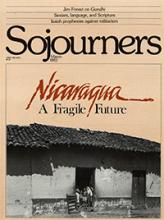Although the sun had been up for more than an hour, the early morning April air remained chilly. Fifty U.S. Christians and Salvadoran refugees from around the city were huddled together against the cold for an Easter sunrise service in Lafayette Park, across the street from the White House. An Easter egg hunt on the White House's south lawn would be the only other evidence of Easter there that day.
The sunrise service was the culmination of Holy Week activities supporting the struggle of Christians in El Salvador. These had included prayer vigils in front of the White House and State Department and a call to fast and pray for our brothers and sisters in that tiny war-torn nation.
On Good Friday denominational leaders from across the country carried a cross through downtown streets with several hundred Christians following in procession. In the Catholic tradition of the "stations of the cross," stops were made at the Organization of American States, the World Bank, the State Department, and the White House. Each stop was accompanied by the reading of Scripture, prayer, and the citation of each organization's role in the Salvadoran conflict.
Our bilingual Easter morning service included songs of faith and hope written by Salvadoran peasants, prayers for the many suffering victims, and the recounting of the resurrection narrative. A moving celebration of the Eucharist was led by an exiled Salvadoran priest. U.S. Carmelite priest Peter Hinde delivered the homily.
Peter had recently returned from a gathering in Costa Rica of families and friends of Latin America's innumerable desaparecidos: the "disappeared," victims of sudden and surreptitious military arrest who were never seen nor heard from again and whose "crime" was to be suspected of siding against their government and for the poor.
Read the Full Article

